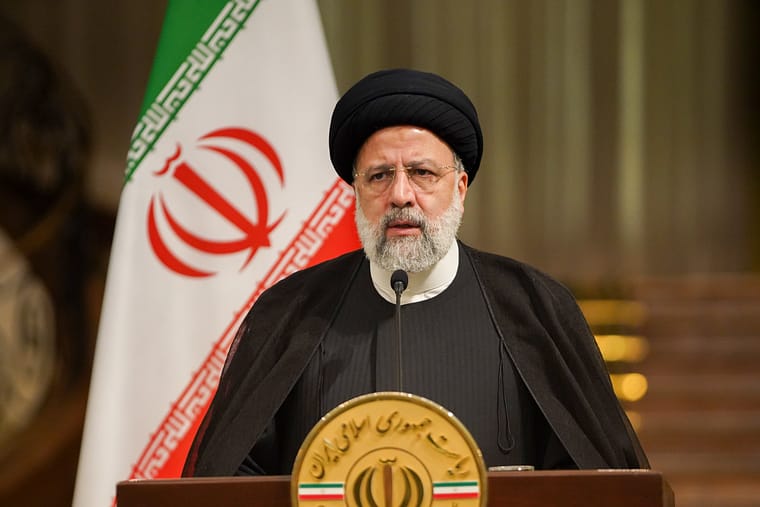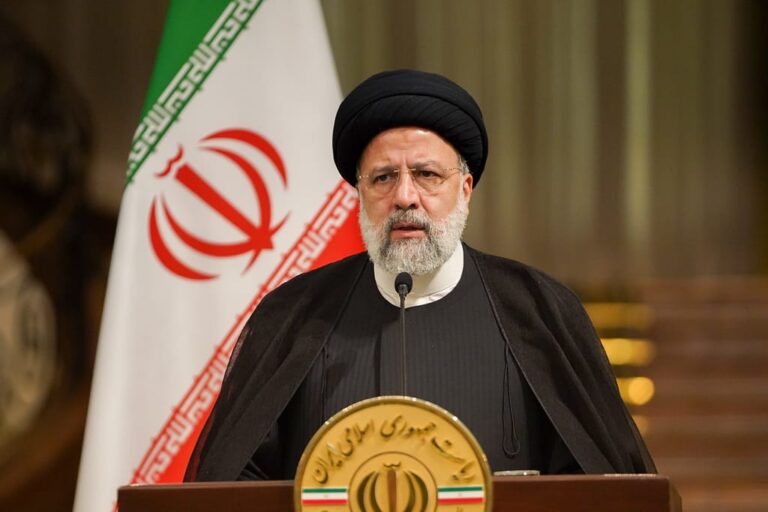
On May 19, 2024, the Iranian president and foreign minister went missing in a helicopter crash, sending shock waves through the country. Against a backdrop of regional instability and new tensions, especially with Israel, the election of a new president is urgent, and the death of Ebrahim Raisi also raises questions about Supreme Leader Ali Khamenei’s vision for Iran. How did the president’s death provoke reactions among the Iranian people? What will happen to Iran’s political and geopolitical landscape ahead of the presidential elections on June 28? IRIS researcher Thierry Coville provides the answers.
How was the news of Ebrahim Raisi’s death and the circumstances surrounding it received in Iran, and what can we learn from his presidency?
The news of a helicopter crash in Iran’s East Azerbaijan province on May 19, 2024, killing President Ibrahim Raisi, sent political shock waves, as it would in any country where a similar incident occurred. The first reaction of the authorities, especially leader Ali Khameni, was to assure them that the operation of the country would not be affected. First Vice President Mohammad Mokbel was appointed interim president until new presidential elections at the end of June 2024. It is noteworthy that he was the chairman of the board of one of Iran’s largest foundations (bonyads), Setad Ezhrai Farman Imam, a semi-state entity that owns a large number of companies, does not pay taxes, and reports only to the leader. This appointment therefore confirms the economic and political influence of this semi-state sector (composed of companies working for the bonyads and the Pasdaran) in the Islamic Republic of Iran. In order to determine the cause of the accident, Chief of Staff Mohammad Bakeri also launched an investigation. All that can be said in this regard is that Iran’s civilian and military aircraft are old (among the “oldest” aircraft in the world). US sanctions limit Iran’s ability to purchase aircraft and spare parts. It should not be forgotten that US sanctions prevent Iran from purchasing Airbuses, since at least 10% of their parts are manufactured in the US. Thus, there is a real risk to passenger safety. The Aviation Safety Network noted in 2022 that there have been nearly 1,800 accidents since the revolution.
During his presidency, Ebrahim Raisi has faithfully carried out the instructions of his leader Ali Khamenei. Unlike his predecessors, there has never been a moment of disagreement between the leader and Ebrahim Raisi. Clearly, the president will be remembered for the ferocious crackdown on the “Women, Life and Freedom” protests in 2022 (which left more than 500 people dead on the side of the protesters) and his failure to respond to the crisis with anything other than a security response. This crackdown sharpened the “rifts” in Iranian society, explaining why many people, especially the families of the victims of this crackdown, openly rejoiced at the president’s death. Other critics focus on his economic policies. Ebrahim Raisi was elected on a promise to improve the economic situation in Iran, explaining that former president Hassan Rouhani was wrong to link all the difficulties facing the Iranian economy to the re-imposition of US sanctions after President Donald Trump withdrew from the Iran nuclear deal in 2018. However, despite these pledges, Iran’s inflation rate has remained very high since his election, rising to nearly 50% since 2021, before slowing to almost 30% at the beginning of 2024. Ebrahim Raisi has therefore contradicted his pre-election rhetoric and realized that inflation cannot actually be curbed as long as US sanctions are in place. The Iranian president could also be accused of making mistakes in economic policy, such as eliminating foreign currency subsidies for the import of essential goods (wheat, oil, medicines) in 2022, further accelerating already high inflation.
With Ebrahim Raisi “expected” to succeed Ayatollah Khamenei and elections set to take place on June 28, what political repercussions can be expected in Iran?
We must remain cautious on this issue. Indeed, Ebrahim Raisi was mentioned as one of the candidates to succeed Leader Ali Khameni. However, Raisi was not the only one. Some believe that Raisi’s “poor” economic performance as president may have undermined his credibility as a future successor to the leader. On the other hand, since the 1979 revolution, many people have been mentioned as possible successors to the leader, but these same people were ousted after a while. What is certain is that the succession of Leader Ali Khameni would be a major event on the Iranian political scene. In this regard, it is noteworthy that the Assembly of Experts, whose mission is to select a new leader and of which Ebrahim Raisi was a member, has just held its first meeting after the elections of March 2024 determined its new composition. All its members agree on a radical political line and, above all, defend the principle of the primacy of religion over politics, excluding all those who do not meet this condition, such as former President Hassan Rouhani.
As for the upcoming presidential elections, everything will depend on the choice of leader Ali Khamenei. If he believes that the country’s overall strategy will remain the same, he will support someone similar to Ebrahim Raisi, that is, a radical candidate who will continue the policies he previously pursued, especially regarding repression and the mandatory wearing of the veil for women. Or he may think that the political crisis that Iran has been experiencing since 2022 should not be allowed to continue and that it is necessary to appoint someone who can take a slightly more realistic approach, capable of limiting the rift between the government and most of society, while maintaining a continuous dialogue with the United States on regional conflicts and the nuclear issue. In any case, the future president will be closer to the radical line that defends Velayat-e-Faqih.
Would a presidential transition really weaken Iran’s position on the international stage and increase the current instability in the Middle East, especially amid a tense regional situation?
Not likely. Iran’s regional strategy is determined mainly by Ali Khameni and his advisors. In fact, Ali Bagheri Kani, who was appointed interim foreign minister after the death of Hossein Amir Abdullahian (who also died in a helicopter crash), is considered to be part of the Movement to Defend Velayat-e Faqih and the “Axis of Resistance”. He was campaign manager for Saeed Jalili, a prominent figure in this movement, during the 2013 presidential elections. He is also in charge of nuclear negotiations in the Raisi government, which shows how important this issue is for Iran.
Iran’s international strategy continues to be characterised by the goal of defending the axis of resistance, while at the same time gradually strengthening previously tense relations with the Gulf Cooperation Council states, such as Saudi Arabia, the United Arab Emirates and Kuwait. In the international arena, the priority is to maintain contacts with the United States, especially to limit the risk of the conflict in the region getting “out of hand” and with a view to “future” negotiations on the nuclear issue. It is noteworthy that all the leaders of this “axis of resistance” attended Ebrahim Raisi’s funeral in Tehran, with Saudi Arabia, the United Arab Emirates and Kuwait sending their foreign ministers.
Translated by Deepl.

